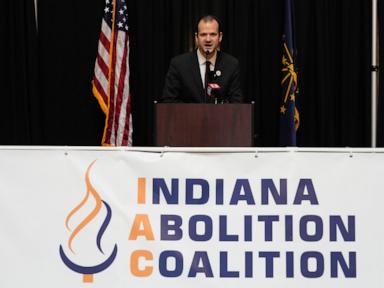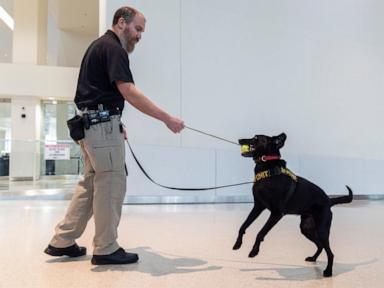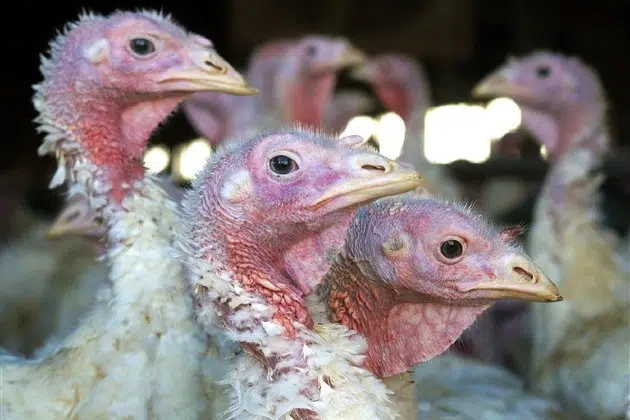Originally published Saturday, March 26th at 2:10 p.m.
Updated Monday, March 28th at 11:30 a.m.
(KNSI) — The Minnesota Board of Animal Health confirms H5N1 Highly Pathogenic Avian Influenza has been discovered in a commercial turkey flock in Stearns County.
Minnesota Governor Tim Walz says the U.S. Department of Agriculture’s emergency team will be deployed in the state on Wednesday. The team is made up of experts from the Minnesota Board of Animal Health and the Minnesota Department of Agriculture, based in Kandiyohi County. They will be in the state to support disease control and containment efforts. They’ll be here for at least three weeks.
Minnesota is ranked number one in turkey production in the nation. Minnesota has more than 660 turkey farms that raise about 40 million birds annually, more than any other state. Turkey production generates $774 million in cash receipts annually, and in 2020, Minnesota exported about 15% of its production, worth approximately $114 million.
On Saturday, it was announced that a commercial turkey flock in Meeker County affecting 289,000 birds and a backyard mixed flock of chickens, ducks, and geese in Mower County both had HPAI infections. Samples were collected from both flocks were tested on March 25th at either the Minnesota Poultry Testing Laboratory or the University of Minnesota Veterinary Diagnostic Laboratory and were confirmed by the U.S. Department of Agriculture’s National Veterinary Services Laboratories in Ames, Iowa. The affected flock in Stearns County is roughly 24,000 birds.
A press release from the Board says these are the first cases of HPAI in the state of Minnesota since 2015. The deadly bird flu outbreak in 2015 was first discovered in early March of that year, and by May 30th, more than 43 million birds in 15 states had been destroyed.
Dr. Dale Lauer, Poultry Program Director for the Board, says, “Poultry producers and backyard flock owners need to be on alert and contact their veterinarian immediately if they see any changes in their flocks. Everyone in poultry facilities needs to follow the site’s biosecurity protocols every time to prevent the spread of disease.”
The sites are quarantined, and the depopulation of birds on the premises is already underway. Poultry is depopulated to prevent the spread of the disease; poultry from the infected flock will not enter the food system. The Board adds that poultry is safe to eat. Proper handling and cooking of poultry and eggs to an internal temperature of 165 ˚F are always advised. The Centers for Disease Control also recently announced this strain of avian influenza is a low risk to the public. No human cases of these avian influenza viruses have been detected in the United States.
“The rapid response and testing surrounding the infected sites is the result of years of preparation with our local, state, federal, and industry partners,” said State Veterinarian Dr. Beth Thompson.
If you have a flock exhibiting any clinical signs of influenza, such as a drop in water consumption or increased mortality, or you believe they might have been exposed to birds with the disease, immediately call your veterinarian. If you are a veterinarian and receive reports of clinical signs of avian influenza, call the Minnesota Poultry Testing Laboratory at 320-231-5170. If it is after hours or on the weekend, call the Minnesota Duty Officer at 1-800-422-0798.
Subsequent detections of HPAI in Minnesota will be posted on the Board’s website.
Congresswoman Michelle Fischbach urges diligence for turkey producers to ensure the disease is contained. “A case of HPAI in Minnesota, while unfortunate, has been anticipated for months. We know that this time will be different from the major outbreak in 2015. We have learned many lessons since then, provided appropriate agencies resources and authorities to prepare and respond, so this case is not catching us off guard. I look forward to working with our partners at the Minnesota Board of Animal Health, Minnesota Department of Agriculture, United States Department of Agriculture, and others to ensure they have the resources they need to address this disease,” said Rep. Fischbach.
___
Copyright 2022 Leighton Enterprises, Inc. All rights reserved. This material may not be broadcast, published, redistributed, or rewritten, in any way without consent.










